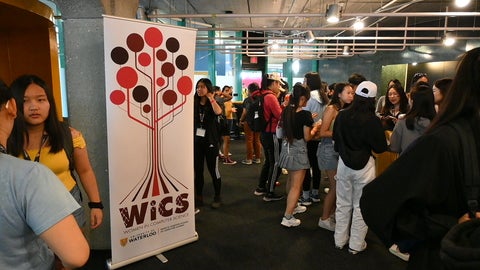Please Note: WiCS will not be sending students to any conference hosted in the US due to security concerns surrounding recent attacks on DEI initiatives in the US.
WiCS Con
WiCS Con is a two-day multi-track conference hosted by WiCS in partnership with our industrial sponsors to offer something unique to our students. The conference sessions cover acing technical interviews, resume tips, unconscious bias, imposter syndrome, negotiating salaries, and lots of technical workshops, drop-in office hours with various companies, and networking.
In 2022, we added in a track for high school students to attend WiCS Con! We will continue to offer this in the 2023 WiCS Con. Each conference session will suggest which of the 2 tracks (high school or undergraduate) the session is primarily aimed at.
WiCS Con 2023 was a hybrid event. Some sessions were offered exclusively online, and others will be offered both in-person and online. Being online has its advantages, such as being accessible to attendees who are unable to travel (e.g., being on co-op).
WiCS Con 2025 was a huge success! The conference hosted mock-interviews in the morning and opened with a Women in Tech panel. Following the opening panel we had several concurrent sessions featuring presentations from WiCS sponsors for students and community members, and workshops hosted by UWaterloo graduate students for our high school attendees. The day ended with a networking reception featuring industry sponsors.
Grace Hopper Celebration of Women in Computing
Each year, we try to fund as many students as possible to attend the Grace Hopper Celebration of Women in Computing.
- The Grace Hopper Celebration is the world's largest conference for technical women that provides access to sessions covering a wide range of subjects and professional development for all career levels.
- Leading researchers present their work, while special sessions focus on the role of women in today’s technology fields, including computer science, information technology, research, and engineering.
- A special shout out to the Mathematics Endowment Fund, whose generous funding provides 20 percent of the funds needed to send WiCS students to the annual Grace Hopper Celebration.
You can take a look at our Grace Hopper Celebration page to see more information and to read reflections from WiCS students that attended GHC.
CAN-CWIC
Closer to home, we aim for a significant Waterloo presence at the Canadian Celebration of Women in Computing; the generosity of sponsors makes the cost of attending very low.
